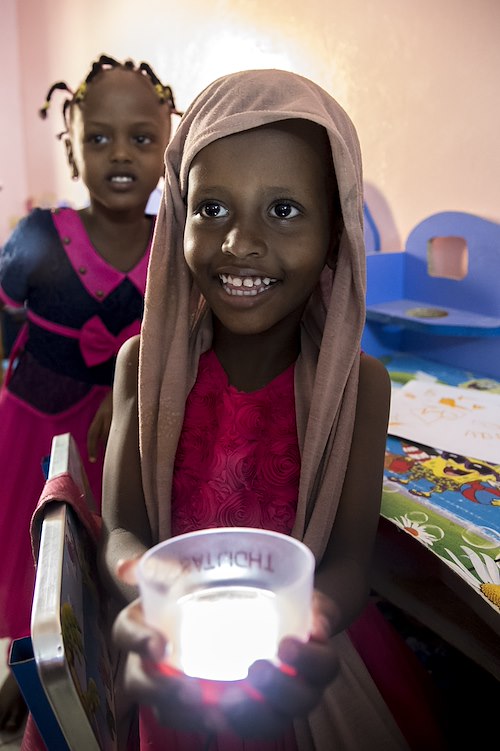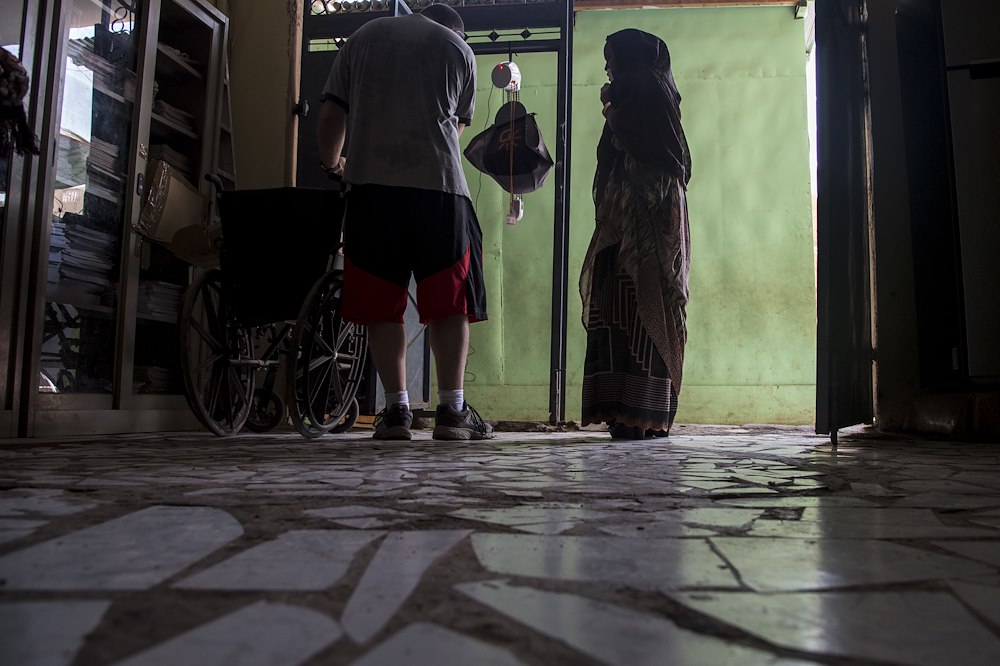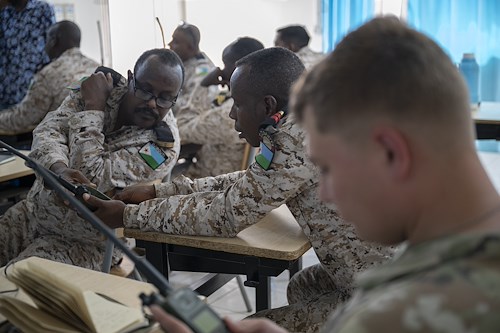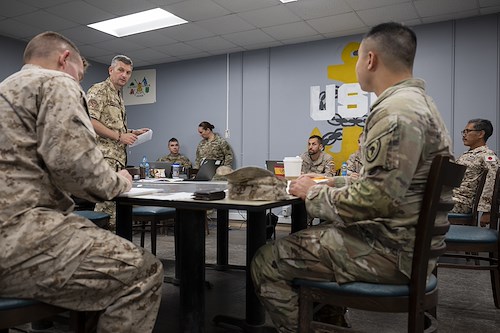Gallery contains 6 images
×
Photo 1 of 6
CJTF-HOA helping light up spaces - and faces - in Djibouti
Djiboutian children test out the new gravity light system donated to their school by U.S. service members from Combined Joint Task Force-Horn of Africa and Camp Lemonnier, Djibouti, who volunteer at Association De Developpment Et Protection De L’Enfant A Besoin (ADPEB), a charity organization in Djibouti City, July 16, 2017. The volunteers raised donations to purchase eight gravity lights in an effort to provide an alternative energy source for lighting their classrooms. (U.S. Air National Guard photo by Tech. Sgt. Joe Harwood)
Photo by: Tech. Sgt. Joe Harwood
Photo 2 of 6
CJTF-HOA helping light up spaces - and faces - in Djibouti
U.S. service members from Combined Joint Task Force-Horn of Africa and Camp Lemonnier, Djibouti, volunteer at Association De Developpment Et Protection De L’Enfant A Besoin (ADPEB), a charity organization in Djibouti City, July 16, 2017. The volunteers raised donations to purchase eight gravity lights in an effort to provide an alternative energy source for lighting their classrooms. (U.S. Air National Guard photo by Tech. Sgt. Joe Harwood)
Photo by: Tech. Sgt. Joe Harwood
Photo 3 of 6
CJTF-HOA helping light up spaces - and faces - in Djibouti
U.S. service members from Combined Joint Task Force-Horn of Africa and Camp Lemonnier, Djibouti, volunteer at Association De Developpment Et Protection De L’Enfant A Besoin (ADPEB), a charity organization in Djibouti City, July 16, 2017. The volunteers raised donations to purchase eight gravity lights in an effort to provide an alternative energy source for lighting their classrooms. (U.S. Air National Guard photo by Tech. Sgt. Joe Harwood)
Photo by: Tech. Sgt. Joe Harwood
Photo 4 of 6
CJTF-HOA helping light up spaces - and faces - in Djibouti
U.S. Army Capt. Charles Wright, gives a demonstration of the new gravity light system donated to their school by U.S. service members from Combined Joint Task Force-Horn of Africa and Camp Lemonnier, Djibouti, who volunteer at Association De Developpment Et Protection De L’Enfant A Besoin (ADPEB), a charity organization in Djibouti City, July 16, 2017. The volunteers raised donations to purchase eight gravity lights in an effort to provide an alternative energy source for lighting their classrooms. (U.S. Air National Guard photo by Tech. Sgt. Joe Harwood)
Photo by: Tech. Sgt. Joe Harwood
Photo 5 of 6
CJTF-HOA helping light up spaces - and faces - in Djibouti
U.S. Army Capt. Charles Wright, gives a demonstration of the new gravity light system donated to their school by U.S. service members from Combined Joint Task Force-Horn of Africa and Camp Lemonnier, Djibouti, who volunteer at Association De Developpment Et Protection De L’Enfant A Besoin (ADPEB), a charity organization in Djibouti City, July 16, 2017. The volunteers raised donations to purchase eight gravity lights in an effort to provide an alternative energy source for lighting their classrooms. (U.S. Air National Guard photo by Tech. Sgt. Joe Harwood)
Photo by: Tech. Sgt. Joe Harwood
Photo 6 of 6
CJTF-HOA helping light up spaces - and faces - in Djibouti
U.S. Army Capt. Charles Wright, gives a demonstration of the new gravity light system donated to their school by U.S. service members from Combined Joint Task Force-Horn of Africa and Camp Lemonnier, Djibouti, who volunteer at Association De Developpment Et Protection De L’Enfant A Besoin (ADPEB), a charity organization in Djibouti City, July 16, 2017. The volunteers raised donations to purchase eight gravity lights in an effort to provide an alternative energy source for lighting their classrooms. (U.S. Air National Guard photo by Tech. Sgt. Joe Harwood)
Photo by: Tech. Sgt. Joe Harwood
DJIBOUTI CITY, Djibouti – In support of regional partnerships, several members of the Combined Joint Task Force - Horn of Africa and Camp Lemonnier spend time volunteering in the community here. Over time, U.S. military members may form relationships with local non-profit charity organizations, shedding light on dark situations – sometimes literally.
On July 16, approximately 10 service members visited Association De Development Et Protection De L’Enfant A Besoin (ADPEB), - or Association of Development and Protection of Street Children with Disabilities, when translated into English. The organization is committed to educating and protecting underprivileged Djiboutian children. On this particular day, the service members brought with them a ray of hope in the form of self-powered lights.
Since ADPEB opened its doors in 2013, military members serving in Djibouti have found various ways to assist the facility, including donations of clothes and school supplies. One way they choose to help the children is by spending time on education. One day a week, the group of volunteers leaves Camp Lemonnier for the ADPEB classrooms to teach the children English and work on math problems together.
Recently, while volunteering at ADPEB, U.S. Army Capt. Charles Wright, a CJTF-HOA contracting officer, noticed the electricity would go out sporadically and the lighting in the classrooms needed improvement. Wright inquired to Ms. Saada Moumin, President of ADPEB, who explained that electricity is a major expense for them. Opening windows allows some light into the classroom, but any reduction in electricity makes a difference.
That conversation sparked an idea by Wright and a group of volunteers who followed up by obtaining lights that work without any electricity, thus making their latest visit to ADPEB different from their previous ones.
“We wanted to offer an alternative source of energy that would reduce their electric bill and give them a reliable source of lighting for their classroom environment,” Wright commented.
The lights work by self-generating power through gravity. Using rocks found in front of the building, Wright filled the bag of the lighting system with the required weight. Each weighted bag system generates 20 minutes of power at a time, powering a daisy chain of LED lights. When the weight reaches the bottom, the pulley must again be initiated by weighting the bags, generating another 20 minutes of power. An easily-operated system, the children of ADPEB can help to recharge the lights safely with adult supervision.
Eight systems were supplied and will be installed strategically in certain areas of the facility, such as near the dry erase boards used during classroom lessons, in hopes that they will help light up the children’s educational experience.
While the donations benefit the children of ADPEB, the service members are also gaining something from the experience, while serving as a conduit for strengthening international partnerships.
U.S. Air Force Tech. Sgt. Corine Kavanagh, CJTF-HOA Personnel Office awards noncommissioned officer in charge, spent a few hours in the sweltering classroom while reviewing basic multiplication and division skills.
“After spending a day with these kids, I feel like I’ve accomplished something significant,” Kavanagh said. “They are smart kids; they want to learn.”
A facility that serves the disadvantaged populous in this region, ADPEB not only cares for a large quantity of minors, but also assists with ailing children.
“At present, there are nearly 140 street children and 30 sick children between the ages of four to fourteen years old who are benefitting from our services,” said Moumin. “The ADPEB provides daily food and drinks, washes their clothes, and teaches them reading and writing, simple mathematics, English, and French, along with other basic courses.”
Within the capacity of ADPEB, Moumin explained that ADPEB is dedicated to street children’s education, health, and social and psychological well-being. As a non-profit charity organization, it receives both local and international donations to meet the needs of the children.
There is currently a waiting list of 250 more children who the ADPEB cannot support without a larger space and further development of their program. They are currently working with the local government to find a bigger space, and have aspirations to acquire funding for a larger facility.
Wright explained the long-term importance of the school in relation to CJTF-HOA’s efforts to counter violent extremist organizations and promote security and stability in the region, saying it’s all about building trust and a reputation for caring.
“There are over 150 kids that would be homeless without this school,” said Wright. “Growing up on the streets they are prime candidates for any violent extremist organization’s recruiters. The involvement of these soldiers teaching and caring for them may contribute to the future prevention of violent extremist organizations gaining power.”






















